Year in Review and Upcoming Activities 2019-2020
| Access to the brochure
| 
| This brochure contains a recap of ITU-T key activities in
2019, and details of what to look out for next.
| January 2020
|
City Science Application Framework NEW
| Access to the flipbook
| 
| The City Science Application Framework provides a four-step methodology for cities to solve their
pressing urban challenges. By using empirical evidence as the basis for evaluation, the city science
application framework offers a reliable and consistent way for cities to assess, prioritize and boost
their city applications.
The report includes the following case studies on city science application: | October 2019
|
Verification Report: Pully under the microscope NEW
|
| 
| The Verification Report: Pully under the microscope summarises the conclusions of
the pilot project ‘ITU Indicators’ of the city
of Pully carried out between 11 May 2017 and
2 February 2018, and encompasses the calculations
and the analysis of the key-performance indicators
(KPI) established by the ITU-T ‘U4SSC’ Working
Group.
| September 2019
|
Implementing ITU-T International Standards to Shape Smart Sustainable Cities: The Case of Moscow
| Access to the Flipbook (available in English)
PDF version
(Available also in Russian)
PDF version
Presentation
| 
| The case study “Implementing ITU-T International Standards to Shape Smart Sustainable Cities: The case of Moscow” offers practical insights into the experiences of Moscow in transforming into a smart sustainable city using the KPIs developed by the United for Smart Sustainable Cities initiative (U4SSC) which are based on ITU-T KPIs for SSC Standards. It measures Moscow’s progress in reaching the objectives of its smart strategies and meeting the Sustainable Development Goals. The results of this case study provide valuable lessons to other aspiring smart sustainable cities.
| November 2018
|
| Implementing ITU-T International Standards to Shape Smart Sustainable Cities: The Case of Singapore | Access to the Flipbook (available in English)
PDF version | 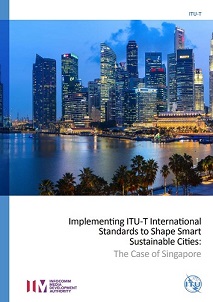
| The case study “Implementing ITU-T International Standards to Shape Smart Sustainable Cities: The Case of Singapore" details Singapore’s journey towards becoming a smart sustainable city. This case study provides a valuable reference point to other cities pursuing smart city strategies. It also offers valuable guidance to ITU standards developers whom are responsible for the refinement of SSC’s KPIs. | November 2017 |
| Collection Methodology for Key Performance Indicators for Smart Sustainable Cities | Access to the Flipbook
(available in English)
PDF version | 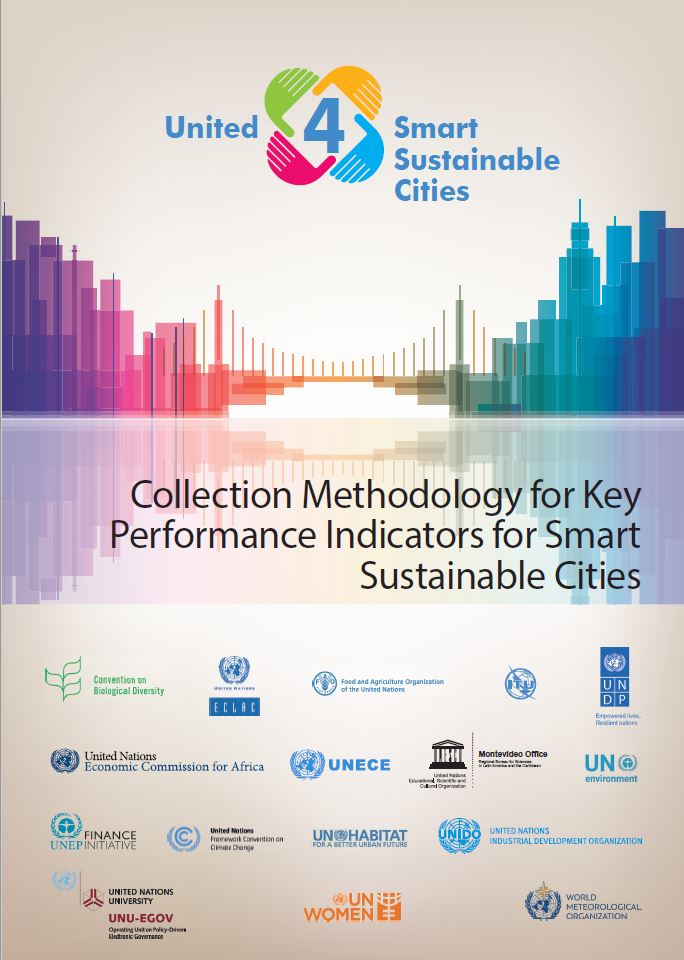 | This publication provides cities with a methodology on how to collect core data or information linked to key performance indicators (KPIs) for smart sustainable cities (SSC). This set of KPIs for SSC was developed to establish the criteria for assessing the smartness and sustainability of a city, and to provide cities with the means for self-assessments, while simultaneously achieving the SDGs. | September 2017 |
| Connecting cities and communities with the Sustainable Development Goals | Access to the Flipbook
(available in English)
PDF version |  | This publication provides an overview of how cities can use ICTs to achieve the Sustainable Development Goals (SDGs). It also maps the case studies to the various international agreements as well as to the SDGs. | September 2017 |
| Enhancing innovation and participation in smart sustainable cities | Access to the Flipbook
(available in English)
PDF version |  | This publication provides a series of case studies on smart governance, smart people and smart economy, which will catapult successful smart city practices into the global spotlight. | September 2017 |
| Implementing SDG11 by connecting sustainability policies and urban-planning practices through ICTs | Access to the Flipbook
(available in English)
PDF version
|  | This publication provides a study of the advantages of using ICTs to support the implementation of the SDGs, namely SDG 11, by facilitating the missing linkages that exist between sustainability policies and urban-planning practices through digitally-enabled urban actions. | September 2017 |
| Implementing ITU-T International Standards to Shape Smart Sustainable Cities: The Case of Dubai | Access to the Flipbook
(available in English)
PDF version | 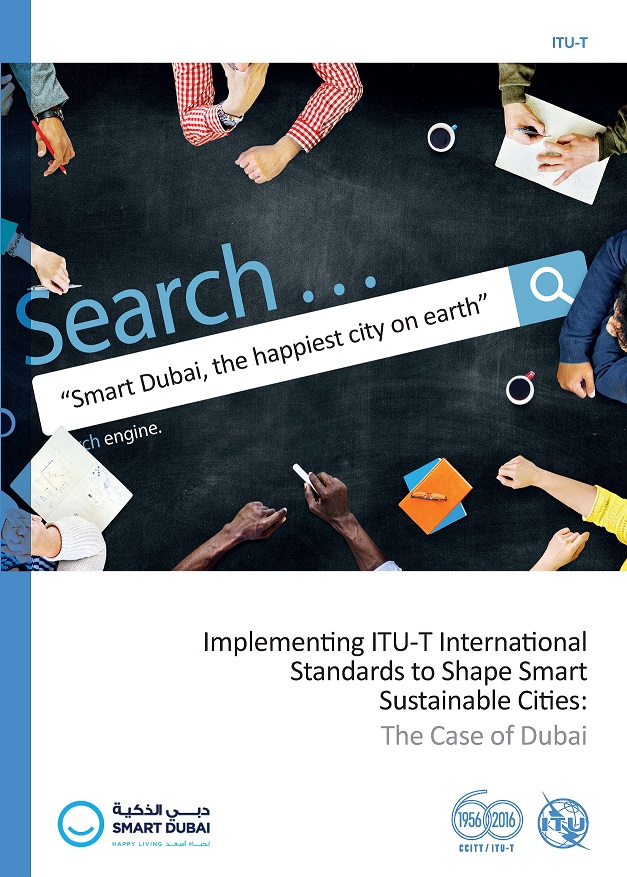 | The case study “Implementing ITU-T International Standards to Shape Smart Sustainable Cities: The Case of Dubai” details Dubai’s ambitious and trailblazing journey towards becoming a smart city, a venture worthy of emulation by other aspiring smart cities around the world. | December 2016 |
| Unleashing the potential of the Internet of Things | Access to the Flipbook (available in English) | 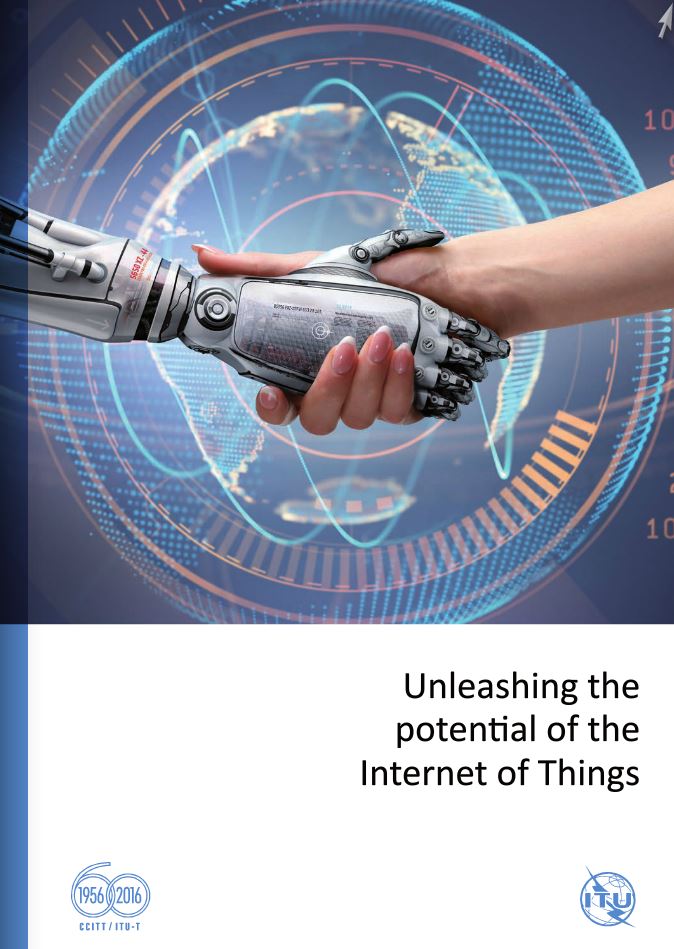 | This flipbook presents a compendium of the first set of ITU international standards for IoT, providing a resource of great value to standards experts interested in contributing to the work of ITU-T Study Group 20. | July 2016 |
| Sustainable Management of Waste Electrical and Electronic Equipment in Latin America | Download report
(available in English and Spanish)
Download PPT
(available in English and Spanish) | 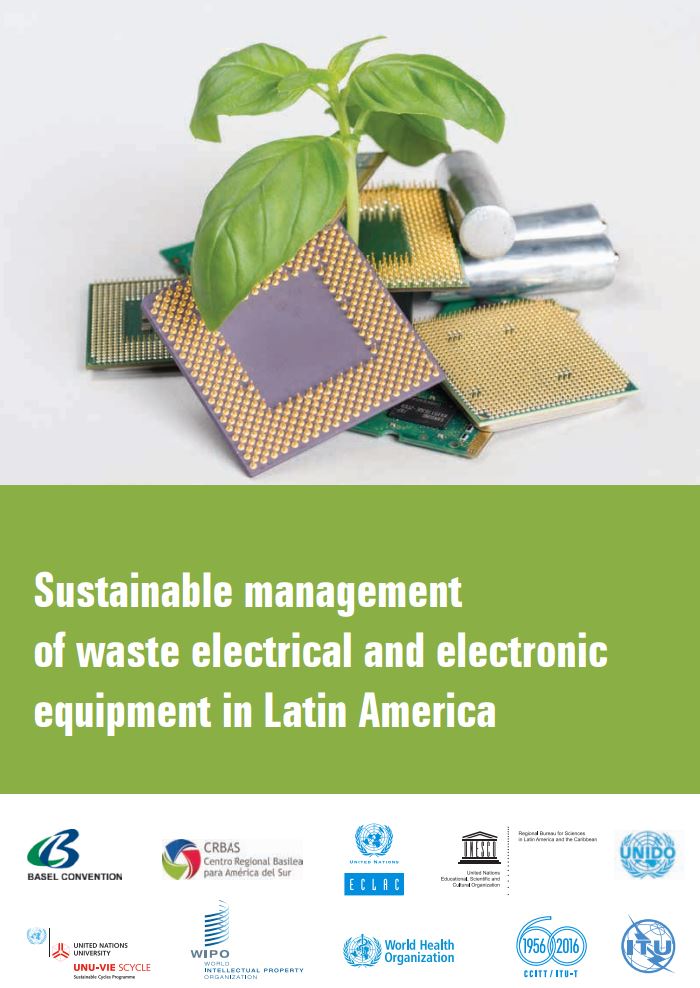 | This report provides an overview of e-waste management in Latin America. It also suggests 10 key steps and provides some guidance to countries how to handle e-waste. | May 2016 |
| Shaping smarter and more sustainable cities: striving for SDGs | Access to the Flipbook (available in English) |  | This compendium provides a comprehensive overview on Smart Sustainable Cities and includes the 21 Technical Reports and Specifications developed by the Focus Group on Smart Sustainable Cities (FG-SSC). | January 2016 |
|
Monitoring of electromagnetic field levels in Latin America |
Download report
(available in English and Spanish) | 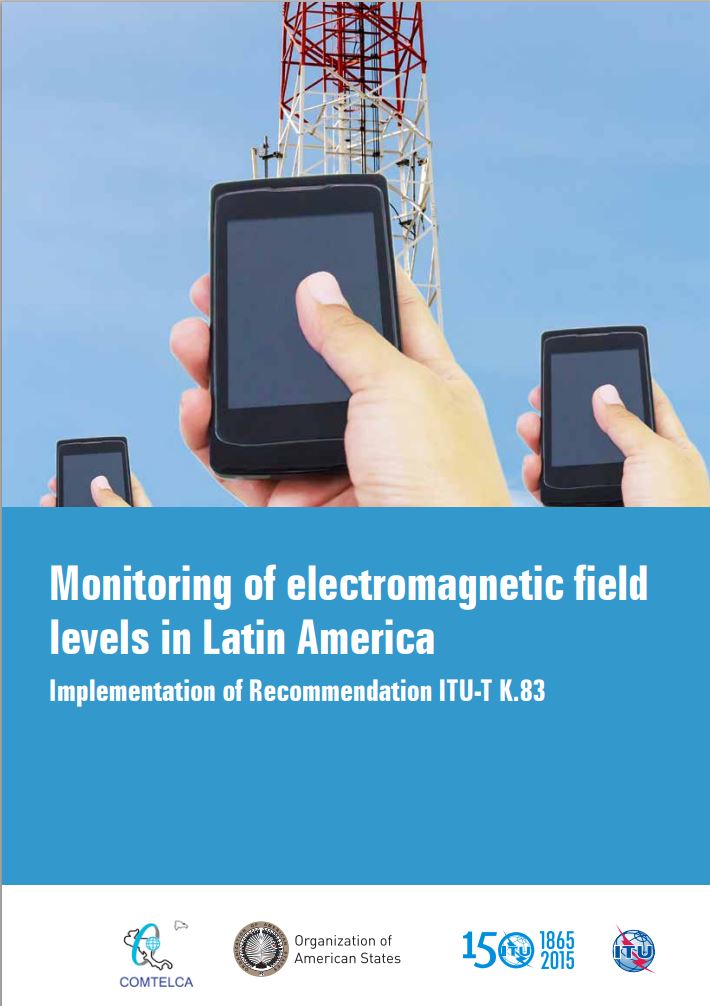 |
This Report provides an overview on how compliance with national and international standards can assist the management and mitigation of public concerns pertaining to EMF, making it easier to garner social acceptance for the installation of new wireless technologies. It also presents case studies on the continuous monitoring systems installed in some countries in Latin America, as well as the policies adopted at governmental level for the implementation of Recommendation ITU-T K.83 in Latin America. |
September
2015 |
| Resilient pathways: the adaptation of the ICT sector to climate change | Download
report
(available in English) |
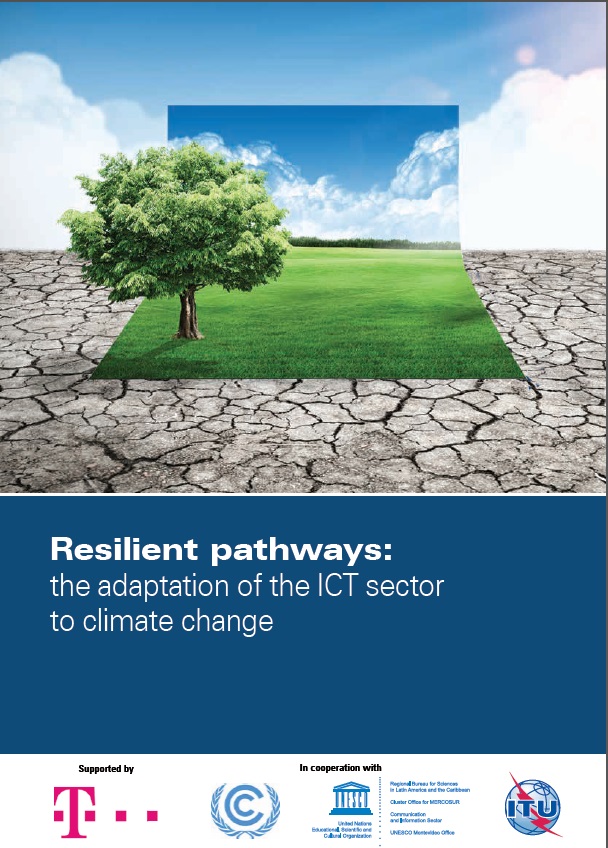
| The main objective of this report is to explore the impacts of climate change on the ICT sector and the potential for adaptation, while emphasizing the need for resilient pathways of action, enabling environments and new standards to foster the sector’s approach to adaptation. | April
2014 |
| Partnering for solutions: ICTs in Smart Water Management | |
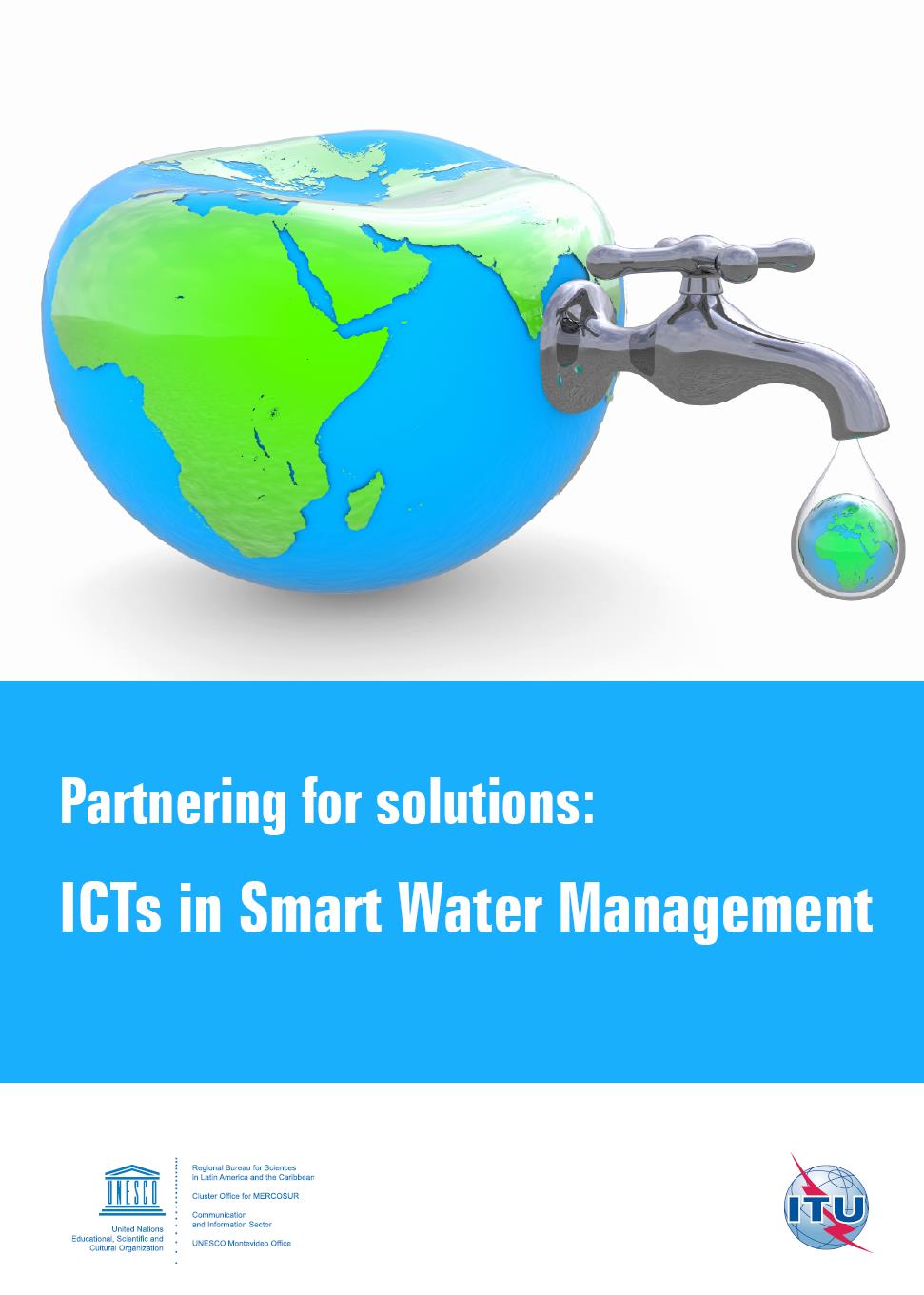
| Though economic growth, climate change and rising populations highly influence the availability of global water resources, strategic incorporation of ICTs in SWM can mitigate some of these challenges. Such achievements, however, are unattainable without proper stakeholder involvement and buy-in. The principal intention of this report is to go further and emphasize how ICTs can overcome some of the challenges faced in the water sector when there is proper stakeholder involvement. | March 2014 |
| The case of Korea: the quantification of GHG reduction effects achieved by ICTs | Download report
(available in English)
| 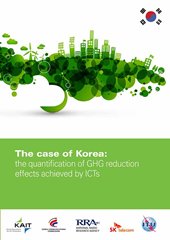 | The purpose of this report is to demonstrate the potential GHG reductions by ICT services, estimate the reduced volume of GHG, and identify major ICT GHG reduction enablers in Korea. This report follows the methodology described in ITU-T Recommendation L.1410 and comprises a review of more than 30 ICT services through a literature study and global benchmarking. | April 2013 |
|
Toolkit on Environmental Sustainability for the ICT Sector |
Download report
(available in English)
Resources |

| The Toolkit on Environmental Sustainability for the ICT sector is an ITU-T initiative which provides plenty of detailed support on how ICT companies can build sustainability into the operations and management of their organizations, through the practical application of international standards and guidelines. | September 2012 |
|
Sustainable ICT in Corporate Organizations |
Download report
(available in English)
Resources |
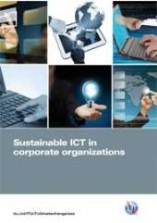
| This document focuses on the main sustainability issues companies face in using ICT products and services in their own organizations across four main ICT areas: data centers, desktop infrastructure, telecommunications networks and broadcasting services. | September 2012 |
|
Sustainable Products |
Download report
(available in English)
Resources |
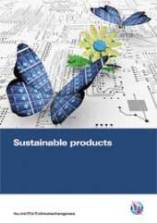
| This document provides technical guidance on environmentally conscious design principles and best practices, covering development and manufacture, through to end-of-life treatment. | September 2012 |
|
Sustainable Buildings |
Download report
(available in English)
Resources |
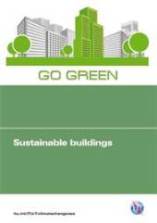
| This document provides technical guidance on environmentally conscious design, maintenance, repair and operating principles and best practices from construction through to lifetime use and de-commissioning. | September 2012 |
|
End of Life Management for ICT Equipment |
Download report
(available in English)
Resources |

| This document covers the various End-of-Life (EOL) stages, and their accompanying legislation. It also provides support in creating a framework for environmentally-sound management of EOL ICT equipment. | September 2012 |
|
General Specifications and KPIs |
Download report
(available in English)
Resources |
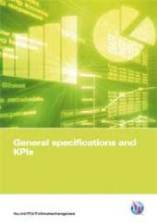
| This document focuses on matching environmental KPIs to an organization’s specific business strategy targets, as well as the construction of standardized process to make sure the KPI data is as useful as possible to management. | September 2012 |
|
Assessment Framework for Environmental Impacts of the ICT Sector |
Download report
(available in English)
Resources |

| This document explores how the various standards and guidelines can be mapped so that an organization can create a sustainability framework that is relevant to its own business objectives and desired sustainability performance. | September 2012 |
| Greening ICT Supply Chains – Survey on Conflict Minerals Due Diligence Initiatives | Download report
(available in English)
Resources |
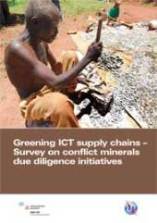
| This survey details and assesses the existing conflict minerals supply chain due diligence initiatives (incorporating national and international legislation, as well as industry-, government- and multi-stakeholder led schemes) that address the management of the broader spectrum of sustainability issues present in conflict minerals supply chains, with a particular focus on the management of environmental impacts. | September 2012 |
|
An Energy-aware Survey on ICT Device Power Supplies |
Download report
(available in English)
Resources |
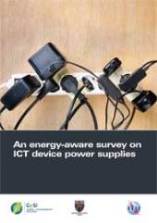
| This survey reports the results of a wide analysis performed on a large set of commercially available external power supplies (more than 300 devices verified and more than 200 electrically measured) to assist the standardization activities within ITU-T Study Group 5 (SG5) (Recommendation ITU-T L.1001). Mechanical, electrical and environmental characteristics have been evaluated; correlation and statistics have also been developed. | September 2012 |
|
Review of Mobile Handset Eco-Rating Schemes |
Download report
(available in English)
Resources |

| This report provides with an overview of eco-rating schemes developed by the mobile handset industry to communicate the sustainability performance of their products to consumers. | September 2012 |
|
Guidance on Green ICT Procurement |
Download report
(available in English)
Resources |

| This Guidance provides directions to ICT companies to promote effective procurement practices with suppliers and customers, and to implement consideration for greater awareness of environmental issues in their business transactions. | September 2012 |
|
Boosting Energy Efficiency through Smart Grids |
Download report
(available in English)
Resources |
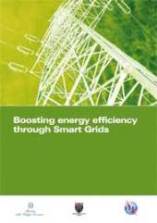
| This report discusses the role of ICT in the smart grid with a view of energy efficiency, with the ultimate goal of hindering climate changes. | September 2012 |
|
Climate Change Adaptation, Mitigation and Information & Communications Technologies (ICTs): the Case of Ghana |
Download report
(available in English)
Resources |
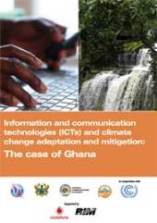
| This report focuses on exploring an increasingly important question: “How can developing countries effectively integrate ICT tools within climate change adaptation and mitigation strategies?”
The contribution of this report is two-fold. It presents the potential of ICTs towards adaptation and mitigation through the concrete case of Ghana, illustrating the challenges and opportunities faced by developing countries in this field. | September 2012 |
|
Using submarine cables for climate monitoring and disaster warning: Opportunities and legal challenges |
Download report
(available in English)
Resources |
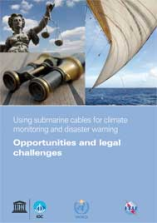
| Recognizing the newness of such uses of undersea telecommunications cables and the complexity of national and international legal-regulatory regimes, this report examines opportunities and legal challenges arising from dual-purpose telecom-marine data cables for ocean and climate monitoring and disaster warning. | July 2012 |
|
Using submarine cables for climate monitoring and disaster warning: Strategy and roadmap |
Download report
(available in English)
Resources |

| This report presents a strategy and roadmap to move forward this vision of incorporating sensors into submarine cables. Nowadays, submarine telecommunication cables that traverse oceans transmit the global Internet, but are deaf, dumb and blind to their ocean environment around them. A future is envisioned when telecommunication companies integrate ocean-observing sensors within their submarine cable systems. This new sensory data would crucially advance our knowledge in monitoring global climate change and tsunamis in the deep ocean. | July 2012 |
|
Using submarine cables for climate monitoring and disaster warning: Engineering Feasibility Study |
Download report
(available in English)
Resources |
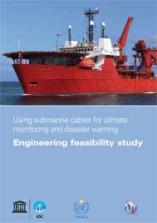
| This report investigates technical feasibility of modifying repeaters to support science instruments for incorporation into commercial telecom cables systems. Allowing and improving long term measurement and data collection, a “Green Repeater" equipped with science instruments will indeed contribute to the effort of better understanding the oceans and the changing climate. | July 2012 |